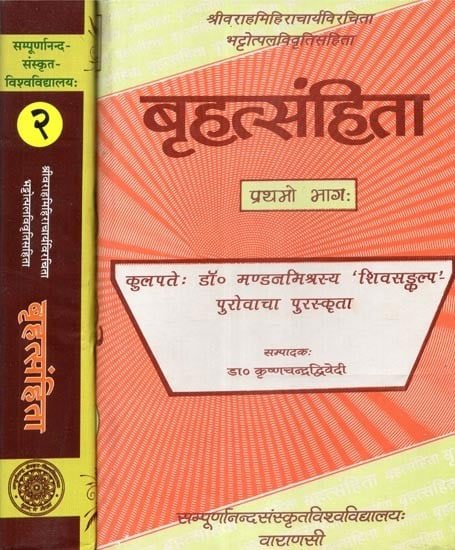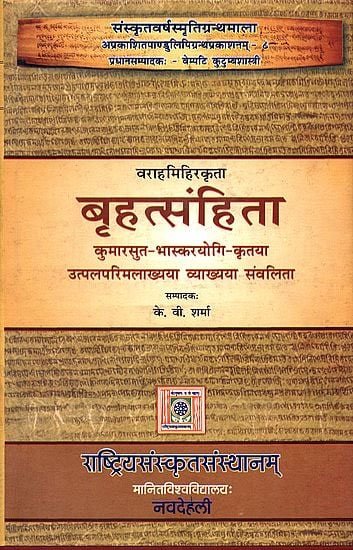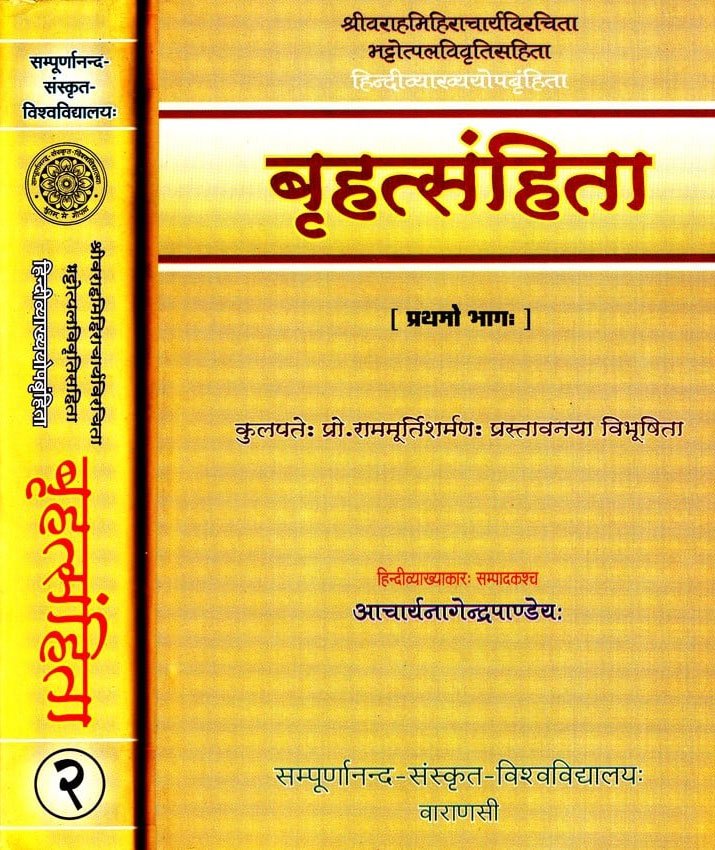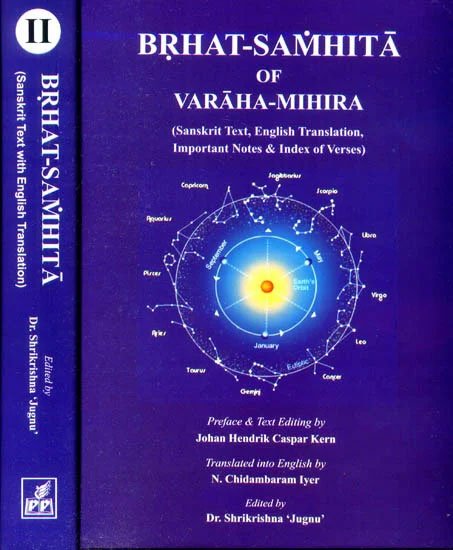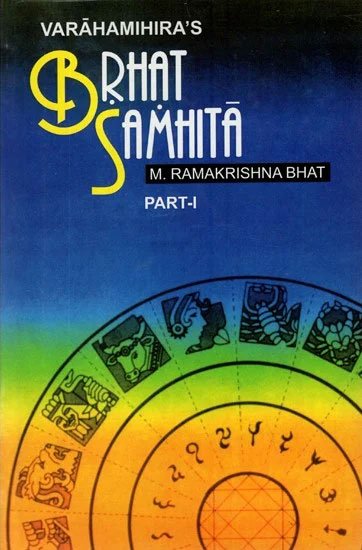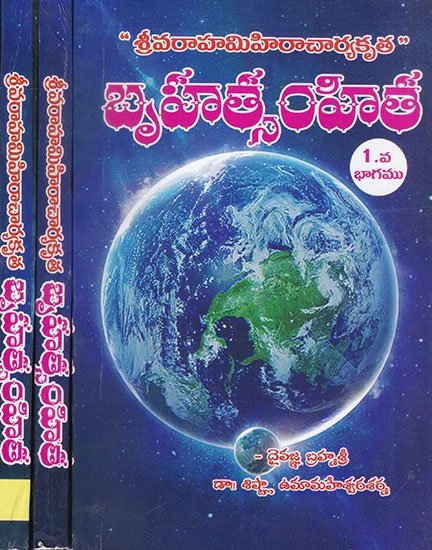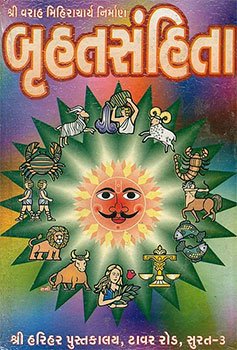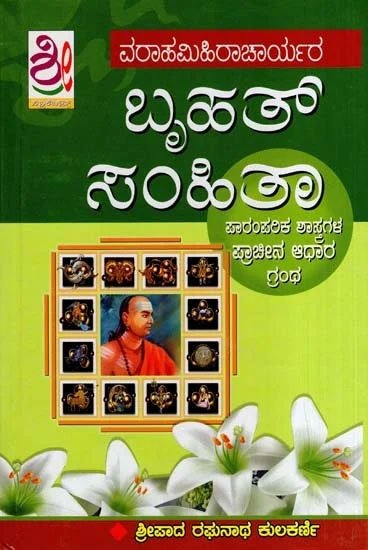Brihat-samhita [sanskrit]
26,560 words
The Sanskrit text of the Brihat-samhita from the 6th-century authored by Varaha Mihira in present-day Ujjain, India. It primarily deals with astrology and astronomy but is presented as an encyclopedia of knowledge.
Verse 67.7
लिङ्गेऽल्पे धनवानपत्यरहितः स्थूलेऽपि हीनो धनैर्मेढ्रे वामनते सुतार्थरहितो वक्रेऽन्यथा पुत्रवान् ।
दारिद्र्यं विनते त्वधोऽल्पतनयो लिङ्गे शिरासन्तते स्थूलग्रन्थियुते सुखी मृदु करोत्यन्तं प्रमेहादिभिः ॥ ७ ॥
[विहीनो]
liṅge'lpe dhanavānapatyarahitaḥ sthūle'pi hīno dhanairmeḍhre vāmanate sutārtharahito vakre'nyathā putravān |
dāridryaṃ vinate tvadho'lpatanayo liṅge śirāsantate sthūlagranthiyute sukhī mṛdu karotyantaṃ pramehādibhiḥ || 7 ||
[vihīno]
The Sanskrit text of Verse 67.7 is contained in the book Brihata Samhita (Sanskrit Text with Hindi Translation) by Pandit Achyutananda Jha. This book is available online or you could buy the latest edition:
Read online Buy now! The Sanskrit text by Pandit Achyutananda Jha (2001)
Glossary of Sanskrit terms
Note: This extracts Sanskrit terms and links to English definitions from the glossary, based on an experimental segmentation of verse (67.7). Some terms could be superfluous while some might not be mentioned. Click on the word to show English definitions.
Linga, Alpa, Dhanavat, Apati, Apatya, Arahita, Sthula, Api, Hina, Dhana, Medhra, Vamanata, Sutartha, Rahita, Vakra, Vakri, Anyatha, Putravat, Putrava, Daridrya, Vinata, Vinati, Tva, Adhah, Adhas, Tanaya, Shira, Asantata, Granthin, Granthi, Yut, Yuta, Yuti, Sukhi, Sukhin, Mridu, Karoti, Antam, Anta, Prameha,
Analysis of Sanskrit grammar
Note: this is an experimental feature and only shows the first possible analysis of the Sanskrit text (Verse 67.7). If the system was successful in segmenting the sentence, you will see of which words it is made up of, generally consisting of Nouns, Pronouns, Verbs, Participles and Indeclinables. Click on the link to show all possible derivations of the word.
- Line 1: “liṅge'lpe dhanavānapatyarahitaḥ sthūle'pi hīno dhanairmeḍhre vāmanate sutārtharahito vakre'nyathā putravān ”
- liṅge' -
-
liṅga (noun, neuter)[nominative dual], [vocative dual], [accusative dual], [locative single]liṅgā (noun, feminine)[nominative dual], [vocative single], [vocative dual], [accusative dual]√liṅg (verb class 1)[present middle first single]
- alpe -
-
alpa (noun, masculine)[nominative plural], [locative single]alpa (noun, neuter)[nominative dual], [vocative dual], [accusative dual], [locative single]alpā (noun, feminine)[nominative dual], [vocative single], [vocative dual], [accusative dual]
- dhanavān -
-
dhanavat (noun, masculine)[nominative single]
- apatya -
-
apati (noun, feminine)[compound], [adverb], [nominative dual], [vocative dual], [accusative dual]apati (noun, masculine)[compound], [adverb], [nominative dual], [vocative dual], [accusative dual]apatya (noun, neuter)[compound], [vocative single]
- arahitaḥ -
-
arahita (noun, masculine)[nominative single]
- sthūle' -
-
sthūla (noun, masculine)[locative single]sthūla (noun, neuter)[nominative dual], [vocative dual], [accusative dual], [locative single]sthūlā (noun, feminine)[nominative dual], [vocative single], [vocative dual], [accusative dual]
- api -
-
api (indeclinable preposition)[indeclinable preposition]ap (noun, neuter)[locative single]
- hīno* -
-
hīna (noun, masculine)[nominative single]√hā -> hīna (participle, masculine)[nominative single from √hā class 1 verb], [nominative single from √hā class 3 verb]
- dhanair -
-
dhana (noun, masculine)[instrumental plural]dhana (noun, neuter)[instrumental plural]
- meḍhre -
-
meḍhra (noun, masculine)[locative single]meḍhra (noun, neuter)[nominative dual], [vocative dual], [accusative dual], [locative single]
- vāmanate -
-
vāmanata (noun, masculine)[locative single]vāmanata (noun, neuter)[nominative dual], [vocative dual], [accusative dual], [locative single]vāmanatā (noun, feminine)[nominative dual], [vocative single], [vocative dual], [accusative dual]
- sutārtha -
-
sutārtha (noun, masculine)[compound], [vocative single]sutārtha (noun, neuter)[compound], [vocative single]
- rahito* -
-
rahita (noun, masculine)[nominative single]√rah -> rahita (participle, masculine)[nominative single from √rah class 1 verb], [nominative single from √rah class 10 verb]
- vakre' -
-
vakra (noun, masculine)[locative single]vakra (noun, neuter)[nominative dual], [vocative dual], [accusative dual], [locative single]vakrā (noun, feminine)[nominative dual], [vocative single], [vocative dual], [accusative dual]vakri (noun, masculine)[vocative single]vakri (noun, feminine)[vocative single]
- anyathā -
-
anyathā (indeclinable)[indeclinable]anyathā (noun, feminine)[nominative single]
- putravān -
-
putravat (noun, masculine)[nominative single]putrava (noun, masculine)[accusative plural]
- Line 2: “dāridryaṃ vinate tvadho'lpatanayo liṅge śirāsantate sthūlagranthiyute sukhī mṛdu karotyantaṃ pramehādibhiḥ || 7 |”
- dāridryam -
-
dāridrya (noun, neuter)[adverb], [nominative single], [accusative single]
- vinate -
-
vinata (noun, masculine)[locative single]vinata (noun, neuter)[nominative dual], [vocative dual], [accusative dual], [locative single]vinatā (noun, feminine)[nominative dual], [vocative single], [vocative dual], [accusative dual]vinati (noun, feminine)[vocative single]
- tva -
-
tu (indeclinable particle)[indeclinable particle]tva (noun, neuter)[compound], [vocative single]
- adho' -
-
adhaḥ (indeclinable preposition)[indeclinable preposition]adhaḥ (indeclinable)[indeclinable]adhas (noun, neuter)[compound], [nominative single], [vocative single], [accusative single]
- alpa -
-
alpa (noun, masculine)[compound], [vocative single]alpa (noun, neuter)[compound], [vocative single]
- tanayo* -
-
tanaya (noun, masculine)[nominative single]
- liṅge -
-
liṅga (noun, neuter)[nominative dual], [vocative dual], [accusative dual], [locative single]liṅgā (noun, feminine)[nominative dual], [vocative single], [vocative dual], [accusative dual]√liṅg (verb class 1)[present middle first single]
- śirā -
-
śira (noun, masculine)[compound], [vocative single]śirā (noun, feminine)[nominative single]
- asantate -
-
asantata (noun, masculine)[locative single]asantata (noun, neuter)[nominative dual], [vocative dual], [accusative dual], [locative single]asantatā (noun, feminine)[nominative dual], [vocative single], [vocative dual], [accusative dual]
- sthūla -
-
sthūla (noun, masculine)[compound], [vocative single]sthūla (noun, neuter)[compound], [vocative single]
- granthi -
-
granthi (noun, masculine)[compound], [adverb]granthin (noun, masculine)[compound], [adverb]granthin (noun, neuter)[compound], [adverb], [nominative single], [vocative single], [accusative single]granthī (noun, masculine)[adverb]granthī (noun, feminine)[compound], [adverb], [vocative single]granthī (noun, neuter)[compound], [adverb], [nominative single], [vocative single], [accusative single]
- yute -
-
yut (noun, masculine)[dative single]yut (noun, neuter)[dative single]yuta (noun, masculine)[locative single]yuta (noun, neuter)[nominative dual], [vocative dual], [accusative dual], [locative single]yutā (noun, feminine)[nominative dual], [vocative single], [vocative dual], [accusative dual]yuti (noun, feminine)[vocative single]√yu -> yuta (participle, masculine)[locative single from √yu class 2 verb], [locative single from √yu class 6 verb], [locative single from √yu class 9 verb]√yu -> yuta (participle, neuter)[nominative dual from √yu class 2 verb], [vocative dual from √yu class 2 verb], [accusative dual from √yu class 2 verb], [locative single from √yu class 2 verb], [nominative dual from √yu class 6 verb], [vocative dual from √yu class 6 verb], [accusative dual from √yu class 6 verb], [locative single from √yu class 6 verb], [nominative dual from √yu class 9 verb], [vocative dual from √yu class 9 verb], [accusative dual from √yu class 9 verb], [locative single from √yu class 9 verb]√yu -> yutā (participle, feminine)[nominative dual from √yu class 2 verb], [vocative single from √yu class 2 verb], [vocative dual from √yu class 2 verb], [accusative dual from √yu class 2 verb], [nominative dual from √yu class 6 verb], [vocative single from √yu class 6 verb], [vocative dual from √yu class 6 verb], [accusative dual from √yu class 6 verb], [nominative dual from √yu class 9 verb], [vocative single from √yu class 9 verb], [vocative dual from √yu class 9 verb], [accusative dual from √yu class 9 verb]√yu -> yuta (participle, masculine)[locative single from √yu class 3 verb]√yu -> yuta (participle, neuter)[nominative dual from √yu class 3 verb], [vocative dual from √yu class 3 verb], [accusative dual from √yu class 3 verb], [locative single from √yu class 3 verb]√yu -> yutā (participle, feminine)[nominative dual from √yu class 3 verb], [vocative single from √yu class 3 verb], [vocative dual from √yu class 3 verb], [accusative dual from √yu class 3 verb]√yu (verb class 2)[present middle third single]
- sukhī -
-
sukhī (noun, masculine)[compound]sukhī (noun, feminine)[compound], [nominative single]sukhin (noun, masculine)[nominative single]
- mṛdu -
-
mṛdu (noun, masculine)[compound], [adverb]mṛdu (noun, neuter)[compound], [adverb], [nominative single], [vocative single], [accusative single]mṛdū (noun, feminine)[adverb], [vocative single]
- karotya -
-
karoti (noun, masculine)[compound], [adverb], [nominative dual], [vocative dual], [accusative dual]karoti (noun, feminine)[compound], [adverb], [nominative dual], [vocative dual], [accusative dual]karoti (noun, neuter)[compound], [adverb], [nominative single], [vocative single], [accusative single]√kṛ (verb class 8)[present active third single]
- antam -
-
antam (indeclinable)[indeclinable]anta (noun, masculine)[adverb], [accusative single]anta (noun, neuter)[adverb], [nominative single], [accusative single]antā (noun, feminine)[adverb]
- pramehād -
-
prameha (noun, masculine)[adverb], [ablative single]
- ibhiḥ -
-
i (noun, masculine)[instrumental plural]
- Cannot analyse 7
Other editions:
Also see the following editions of the Sanskrit text or (alternative) English translations of the Verse 67.7
Brhatsamhita with the Commentary of Bhattotpala
by Krishna Chandra Dwivedi (2016)
Publisher: Sampurnanand Sanskrit University; 1229 pages;
Buy now!
Brihat Samhita with the Commentary of Utpalapatimala of Yogisvara
by K. V. Sharma (2012)
Publisher: Rashtriya Sanskrit Sansthan, Janakpuri; 754 pages; ISBN-10; 8186111360; ISBN-13: 9788186111369
Buy now!
Brihat Samhita (Hindi Translation)
by K. V. Sharma (2002)
Publisher: Sampurnanand Sanskrit University; 2359 pages; ISBN-13: 9789387890008.
Buy now!
Brhat Samhita (English translation)
by N. Chidambaram Iyer (2022)
Publisher: Parimal Publication Pvt. Ltd.; 801 pages; Edited by Dr. Shrikrishna Jugnu; ISBN-10: 8171104215; ISBN-13: 9788171104215.
Buy now!
Brhat Samhita (English with notes)
by M. Ramakrishna Bhat (2010)
Publisher: Motilal Banarsidas Publishers Pvt. Ltd.; 1155 pages; ISBN-10: 8120810600; ISBN-13: 9788120810600.
Buy now!
Brhat Samhita (Telugu translation)
by Sishtla Umamaheswara Sharma (2020)
Publisher: Mohan Publications, Andhra Pradesh; 846 pages.
Buy now!Preview of verse 67.7 in Kannada sript:
ಲಿಙ್ಗೇಽಲ್ಪೇ ಧನವಾನಪತ್ಯರಹಿತಃ ಸ್ಥೂಲೇಽಪಿ ಹೀನೋ ಧನೈರ್ಮೇಢ್ರೇ ವಾಮನತೇ ಸುತಾರ್ಥರಹಿತೋ ವಕ್ರೇಽನ್ಯಥಾ ಪುತ್ರವಾನ್ ।
ದಾರಿದ್ರ್ಯಂ ವಿನತೇ ತ್ವಧೋಽಲ್ಪತನಯೋ ಲಿಙ್ಗೇ ಶಿರಾಸನ್ತತೇ ಸ್ಥೂಲಗ್ರನ್ಥಿಯುತೇ ಸುಖೀ ಮೃದು ಕರೋತ್ಯನ್ತಂ ಪ್ರಮೇಹಾದಿಭಿಃ ॥ ೭ ॥
[ವಿಹೀನೋ]
Brhat Samhita (Gujarati translation)
by - (2000)
Publisher: Shree Harihar Pustakalay, Surat; Author: Shri Varahamihira Acharya (શ્રી વરાહમિહીરાચાર્ય); 432 pages.
Buy now!Preview of verse 67.7 in Gujarati sript:
લિઙ્ગેઽલ્પે ધનવાનપત્યરહિતઃ સ્થૂલેઽપિ હીનો ધનૈર્મેઢ્રે વામનતે સુતાર્થરહિતો વક્રેઽન્યથા પુત્રવાન્ ।
દારિદ્ર્યં વિનતે ત્વધોઽલ્પતનયો લિઙ્ગે શિરાસન્તતે સ્થૂલગ્રન્થિયુતે સુખી મૃદુ કરોત્યન્તં પ્રમેહાદિભિઃ ॥ ૭ ॥
[વિહીનો]
Brhat Samhita (Kannada translation)
by Sripada Raghunatha Kulkarni (2021)
Publisher: Srinidhi Publications, Bangalore; 668 pages with illustrations.
Buy now!Preview of verse 67.7 in Kannada sript:
ಲಿಙ್ಗೇಽಲ್ಪೇ ಧನವಾನಪತ್ಯರಹಿತಃ ಸ್ಥೂಲೇಽಪಿ ಹೀನೋ ಧನೈರ್ಮೇಢ್ರೇ ವಾಮನತೇ ಸುತಾರ್ಥರಹಿತೋ ವಕ್ರೇಽನ್ಯಥಾ ಪುತ್ರವಾನ್ ।
ದಾರಿದ್ರ್ಯಂ ವಿನತೇ ತ್ವಧೋಽಲ್ಪತನಯೋ ಲಿಙ್ಗೇ ಶಿರಾಸನ್ತತೇ ಸ್ಥೂಲಗ್ರನ್ಥಿಯುತೇ ಸುಖೀ ಮೃದು ಕರೋತ್ಯನ್ತಂ ಪ್ರಮೇಹಾದಿಭಿಃ ॥ ೭ ॥
[ವಿಹೀನೋ]
![Brihat-samhita [sanskrit] - book cover](/uploads/a/Brihat-Samhita-Sanskrit.jpg)
